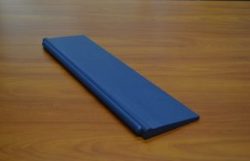Plastics Can Outperform Metals
September 1, 2025
When designing components, engineers often fall back on metals like steel or aluminum. Metals are strong and well-known. However, engineered plastics frequently provide better performance in modern, high-performance environments. Plastics are lighter, resist corrosion, reduce friction and noise, and can lower both production and maintenance costs. At Eagle Performance Plastics, we specialize in machining high-performance plastics that replace metals in critical applications.
While plastics are often overlooked in favor of metals, these five materials show why plastics can be the smarter choice for many industrial applications.
5 Proven Plastics in Metal-to-Plastic Conversion
- PTFE (Polytetrafluoroethylene, trade name Teflon)– PTFE offers unmatched chemical resistance and can withstand high temperatures. It is ideal for seals, gaskets, and valve components in fluid handling and pharmaceutical applications where metals might corrode, seize, or require frequent maintenance.
- UHMW-PE (Ultra High Molecular Weight Polyethylene)– UHMW-PE delivers outstanding impact strength and very low friction, making it perfect for conveyors, star wheels, and other material handling components. Unlike metals, it won’t rust or corrode, ensuring longer-lasting performance in tough environments.
- PEEK (Polyetheretherketone)– PEEK combines mechanical strength, chemical resistance, and temperature stability. It replaces metal in demanding food processing and life sciences applications where durability, corrosion resistance, and regulatory compliance are required.
- Acetal (POM Copolymer and Homopolymer, trade name Delrin)– Acetal is strong, rigid, and dimensionally stable. It is often chosen for gears, bushings, and fluid handling components where metals are heavier, noisier, or prone to corrosion. Its smooth surface reduces friction and improves efficiency.
- Nylon (PA6 (Cast), PA66 (Extruded))– Nylon offers toughness, wear resistance, and reliable performance under load. It is widely used in material handling systems for guides, rollers, and moving parts that would traditionally rely on metal. Nylon provides quieter operation and can absorb shock and vibration better than metals, making it a versatile alternative in industrial applications.
Why Plastics Outperform Metal
Metal will always have its place, but in high-performance environments plastics offer clear advantages. Switching from metals to plastics can deliver:
- Reduced weight and lower energy consumption
- Greater corrosion and chemical resistance
- Lower noise and vibration
- Longer component life and reduced maintenance
- Design flexibility for complex or custom components
Real-World Example
A food processing customer needed a scraper that could meet FDA standards, withstand mechanical stress, and be easily detectable if broken. Eagle Performance Plastics supplied a metal- and X-ray-detectable Acetal (POM) scraper, ensuring food safety, durability, and easy detectability, all while maintaining dimensional precision and reducing downtime.
Read more about how Eagle Performance Plastics can develop custom plastic solutions to your unique needs!
Avoid These Common Mistakes
To keep your parts running longer and smoother, avoid these common mistakes:
- Choosing materials solely based on price
- Assuming all plastics are equally resistant to wear or chemicals
- Overlooking operating conditions, such as temperature and moisture
- Skipping early consultation with a materials specialist
Eagle Performance Plastics: Your Partner in Metal-to-Plastic Conversion
Choosing the right plastic is more than picking a material from a list. Eagle Performance Plastics helps engineers and designers:
- Evaluate existing metal components for plastic replacement
- Recommend plastics that extend service life and improve performance
- Provide precision machining for perfect fit and function
Switching from metal to plastics can reduce downtime, improve efficiency, and extend part life. Contact Eagle today to talk to a material specialist!
